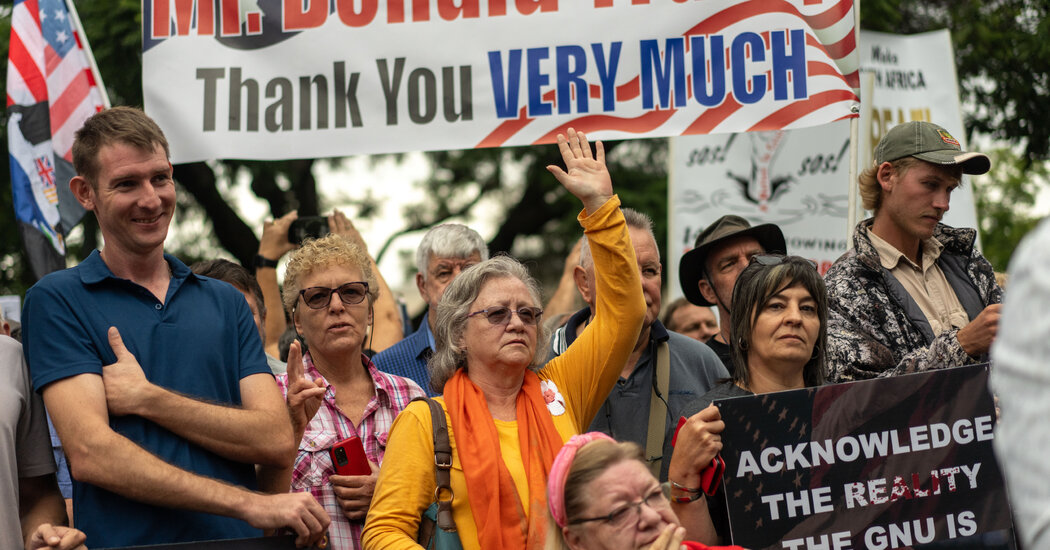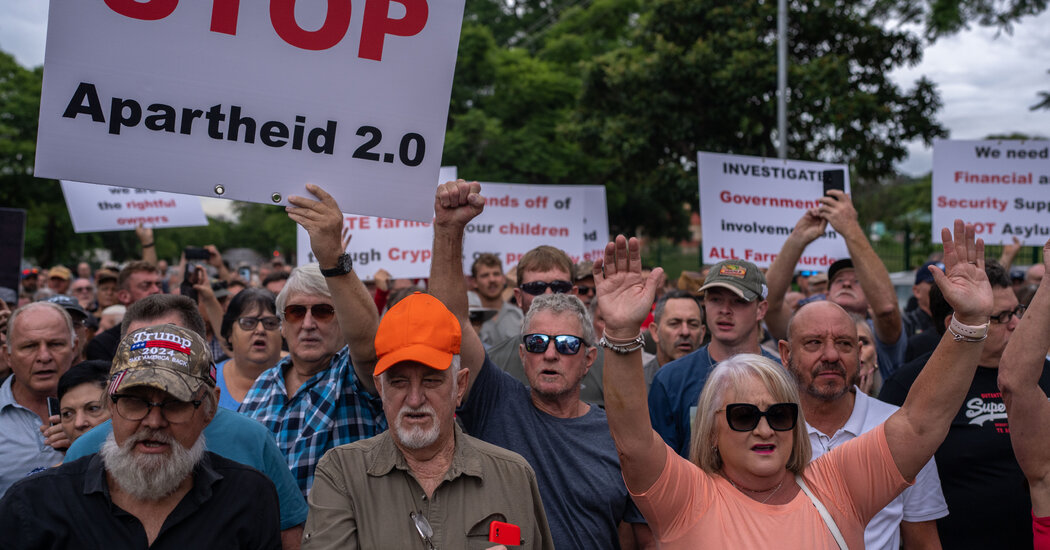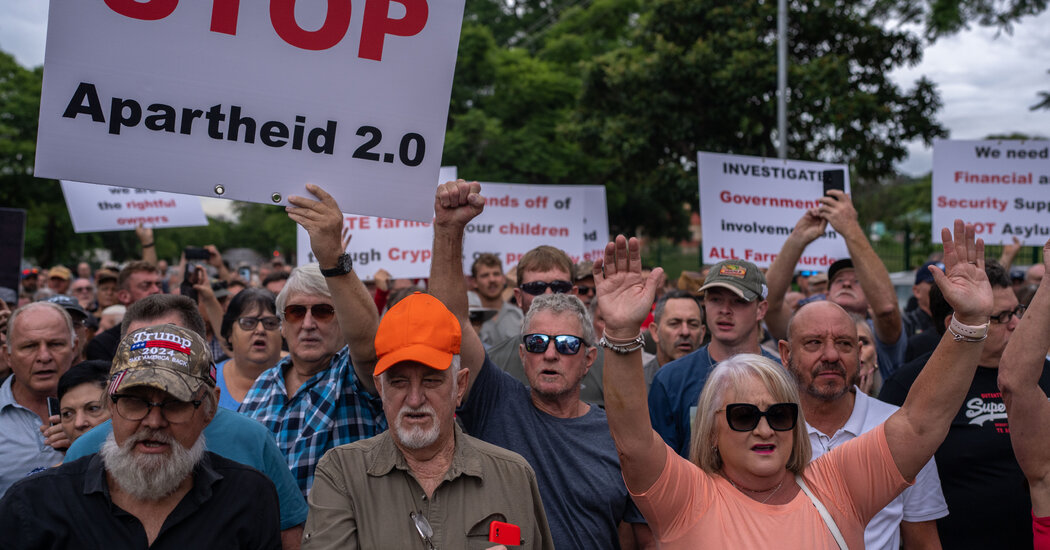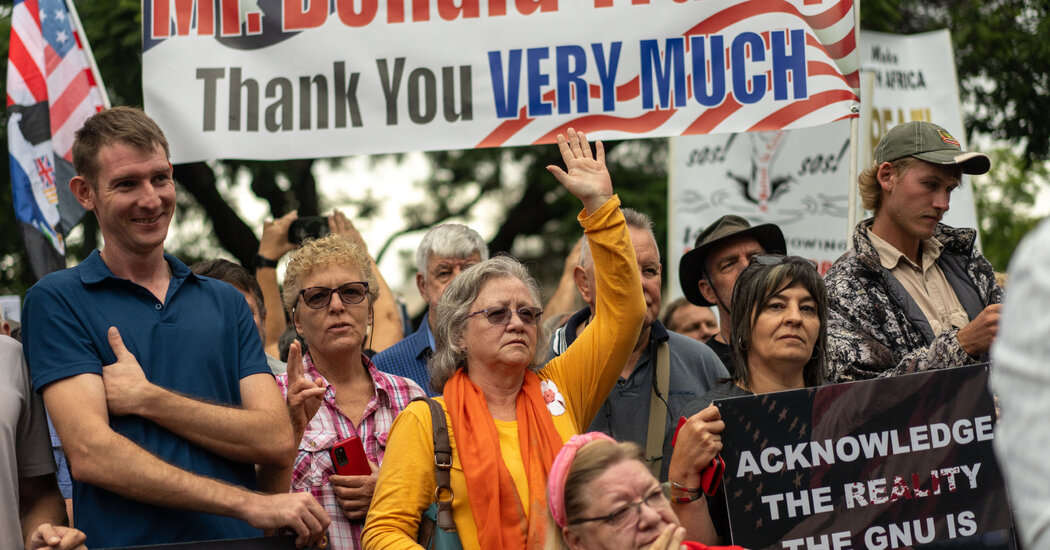“In a shocking move that has sparked outrage and disbelief, the Trump administration is set to bring the first group of white Afrikaners to the United States as refugees, in a move that has been labeled as “racist” and “hypocritical” by critics. This comes at a time when the US has been tightening its borders and implementing harsh immigration policies, particularly against people of color.

The news, first reported by The New York Times, has sent shockwaves across the globe, raising questions about the administration’s motivations and the implications of this move. As the world grapples with the unfolding drama, one thing is clear – this is a move that will have far-reaching consequences, and one that will be closely watched by the global community.

Implications and Analysis

The recent announcement by Trump officials to bring the first group of white Afrikaners to the United States as refugees has sparked widespread controversy and raised questions about racial bias in refugee admissions. The move has been criticized for perpetuating racial tensions in the US, and many have expressed concern about the implications of this decision on the country’s refugee resettlement program.

Racial Bias in Refugee Admissions
The Trump administration’s decision to halt virtually all other refugee admissions shortly after taking office in January has been met with criticism from human rights organizations and advocacy groups. The fact that the administration is now allowing in white Afrikaners, while shutting the door to refugees from most other countries, has been identified as a clear case of racial bias.
This move has been seen as a continuation of the administration’s efforts to restrict immigration and perpetuate a narrative of racial and ethnic superiority. The fact that the administration has also provided security escorts to officials conducting the interviews of potential refugees has raised concerns about the potential for political manipulation and bias in the refugee screening process.

International Reactions and Criticisms
The South African government has reacted to the program with a mix of surprise and concern. The government has stated that it is working with the US government to understand the program and ensure that it is in line with international law and human rights standards. However, many human rights organizations have criticized the program, arguing that it is a clear case of racial discrimination and perpetuates existing inequalities.
Human Rights Watch has stated that the program is “unacceptable” and that it “perpetuates racial discrimination” against black South Africans. The organization has called on the US government to reverse its decision and to work towards a more inclusive and equitable refugee resettlement program.
Practical Concerns and Next Steps
The integration of the new refugees into American society is likely to pose significant challenges. The Afrikaners are a white minority group in South Africa, and many have expressed concerns about their ability to adapt to life in the US. The administration has stated that it is working to provide support and resources to help the new refugees integrate, but many have questioned the adequacy of these efforts.
Furthermore, the potential security risks associated with bringing in a group of refugees from a country with a history of political instability and violence have been identified as a major concern. The administration has stated that it is working to ensure the security of the new refugees, but many have questioned the effectiveness of these efforts.
The decision to bring in white Afrikaners as refugees is likely to have significant implications for the US refugee resettlement program. It has raised questions about the criteria used to determine refugee status and has sparked concerns about the potential for racial bias in the refugee screening process. As the program moves forward, it is essential that the US government takes steps to address these concerns and to ensure that the program is fair, equitable, and in line with international human rights standards.
- Provide support and resources to help the new refugees integrate into American society.
- Take steps to address the potential security risks associated with bringing in a group of refugees from a country with a history of political instability and violence.
- Ensure that the refugee screening process is fair, equitable, and in line with international human rights standards.
- Work with international partners to address the root causes of migration and to provide support to refugees around the world.
Conclusion
In conclusion, the recent reports by The New York Times reveal a shocking development in the realm of refugee resettlement, as Trump officials are set to bring the first group of White Afrikaners to the United States next week. The article highlights the contentious efforts of the administration to redefine the concept of persecution and grant refugee status to a group of individuals fleeing South Africa, citing racial and ethnic persecution as the primary reason.
The significance of this move cannot be overstated, as it raises important questions about the U.S. refugee policy, national security, and the broader implications of racial and ethnic tensions in the country. The decision to grant refugee status to the White Afrikaners could have far-reaching consequences, potentially creating a precedent for future refugee claims based on racial or ethnic grounds. Moreover, it raises concerns about the potential for xenophobic and anti-immigrant sentiments to be further emboldened.
As we move forward, it is crucial that we continue to engage in a nuanced and informed discussion about the complexities of refugee resettlement and the implications of such decisions. The United States has a long history of providing refuge to those fleeing persecution, and it is essential that we uphold our values of compassion, empathy, and human rights. As we navigate this complex issue, we must remain vigilant and committed to upholding the principles of justice, equality, and human dignity. The fate of the White Afrikaners and the future of U.S. refugee policy hang in the balance, and it is our responsibility to ensure that we make decisions that promote peace, understanding, and a more just and equitable world.
